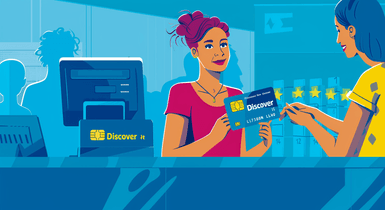How Does Chase Credit Journey Work?
Contents

Knowing your credit score is crucial before applying for a credit card or loan. After all, when you know where you stand, you can take proactive steps to boost it. What’s even better is that you can easily check your credit score online with specialized tools like Chase Credit Journey.
Curious about what this service offers? Wondering if you can access it without being a Chase client? Stick around to uncover its features, its advantages and disadvantages, as well as some great alternatives.
What Is Chase Credit Journey?

You already know how to open a Chase bank account if you're reading this article, so let's move on to the next step. Chase Credit Journey is a free, user-friendly tool for monitoring your credit. It allows you to keep tabs on your credit score and activities online.
One of the great things about the service is that it can be used by people who use a Chase credit card as well as those who don’t. Before understanding how to check a credit score on a Chase app, you’ll need to create an online account with just a few simple clicks. Once logged in, scroll down to find “Your credit score” on the left. Clicking “Free score, updated weekly,” and voilà—your score will appear by default each time you log in.
Another question remains — which credit score does Chase Credit Journey use? With the tool, you can look up VantageScore 3.0 based on Experian data. While it differs from the most popular FICO score, it’s calculated using similar criteria, so your results will be close.
How Does Chase Credit Journey Work?: Main Features

Before diving into how to check Chase credit score, let’s break down the standout features of the tool that you will get:
Track Every Detail of Your Credit Score
Chase's main feature is its weekly credit score updates based on Experian data. The app lists six factors used for the Chase Credit Journey calculations: credit utilization, total balance, payment history, account age, hard inquiries, and available credit. You can toggle these factors to see how they influence your score.
Receiving Alerts and Updates
Another reason to use Chase Credit Journey is that you can get real-time alerts on your credit score changes, new inquiries, account openings, and more. It’s also possible to enable free identity monitoring to guard against data misuse. Credit card users can also set up alerts and receive reminders for payment due dates or specific transactions.
Using the Credit Score Simulator
Another interesting feature is the simulator tool. By using it, you can simulate in real time how different actions will affect your credit score. For example, you can choose “missing out on a credit card payment” and “getting declined for a loan” to see how much your Chase credit score drops.
Access In-Depth Credit Information
Chase Credit Journey provides insights from Experian report information. This includes personal information, public records, consumer statements, open and closed accounts, public records, and more. This helps you ensure that all information is accurate and up to date.
Previously, we have already talked about the size of the Chase bank wire transfer and how to avoid Chase monthly service fee in our additional articles.
What Are the Pros and Cons of Chase Credit Journey?

Now, let’s take a look at the pros and cons of the service.
Pros:
- Completely free to use;
- Open to non-Chase clients;
- Provides timely credit score alerts;
- Offers practical credit-building tips;
- Includes a credit score simulator tool.
Cons:
- Doesn’t show your FICO credit score;
- Limited to Experian data only.
Is Chase Credit Journey Accurate?

Is Chase Credit Journey good in terms of accuracy? Yes! The tool uses the VantageScore 3.0 model, relying on data from major credit bureaus and provides results based on six main factors:
- Payment history;
- Credit type;
- Credit utilization;
- Total balances;
- Latest credit checks;
- Current available credit.
The calculation model has been developed by TransUnion, Experian, and Equifax, which ensures its accuracy. But that leads to another question that concerns individuals — does Chase Credit Journey affect your credit score? The answer is no. The information is pulled with a soft inquiry, so there is no negative effect on your credit score. The only downside is that numerous lenders still prefer FICO scores instead of VantageScore, so it’s something to keep in mind, as numbers might vary slightly.
If you are interested in alternatives to Chase Credit Journey, some popular options include:
AnnualCreditReport.com
This service offers free reports from all three major credit reporting bureaus. You can get a free report every 12 months from each agency—or, or stagger your reports throughout the year for continuous updates: every 4 months if it’s more convenient for you. The service doesn’t provide a credit score check.
CreditWise (Capital One)
Another alternative to the Chase Credit Journey check is CreditWise from Capital One. This service brings you access to VantageScore 3.0 but provides credit reporting from TransUnion instead of Experian. You will also get in-depth credit insights and identity monitoring.
Credit Karma
The Credit Karma tool provides scores from Equifax and TransUnion and also provides personalized credit tips and recommendations on improving your credit score. A major advantage is that your score is updated every day.
It's useful to know how to close Chase account if you need to for any reason.
Conclusion
It is clear that using Chase Credit Journey for monitoring your credit score is a fantastic idea, as it provides a convenient way to stay on top of your financial health. One of the best aspects of the tool is that you don’t need to be a Chase client—simply create an account to access a wealth of useful features.
Chase offers this service for free, with your credit score updated weekly. You can set up various alerts, enable identity monitoring, and even use a simulator tool to see how different actions impact your score. Overall, it’s a highly beneficial option for most people.




